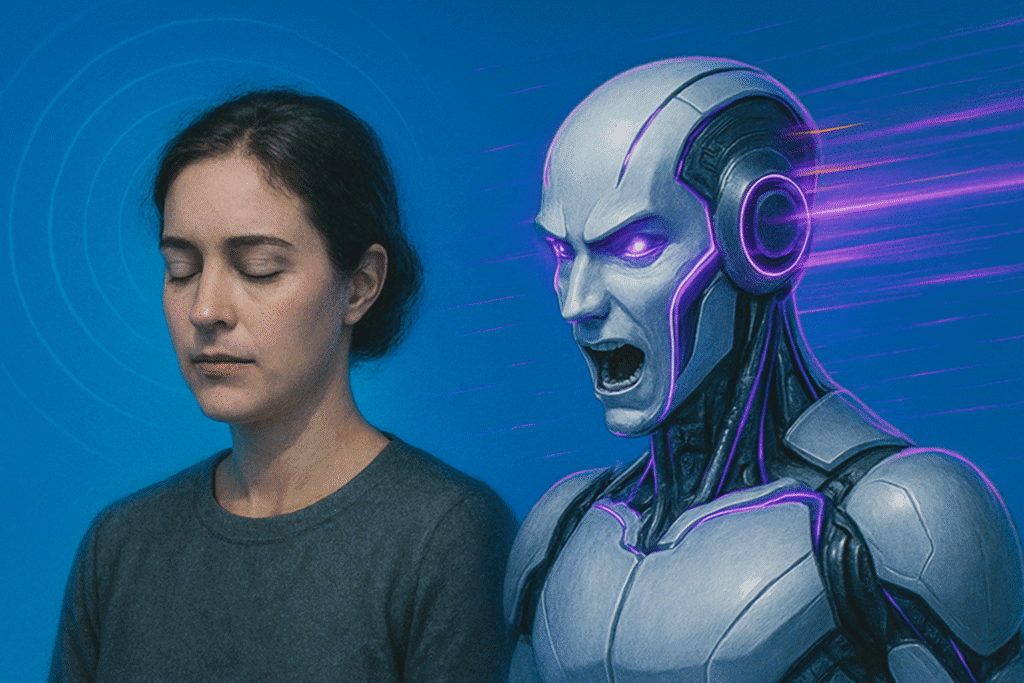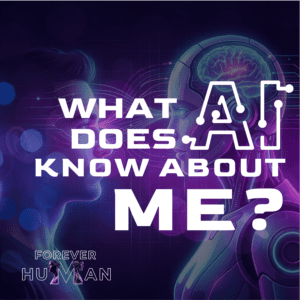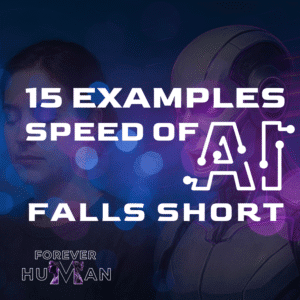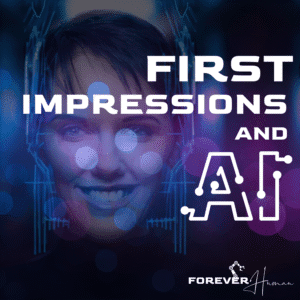AI Moves Fast. Humans Move Wise

Speed has become the crown jewel of AI. Machines analyze, compute, and respond in milliseconds, faster than any human could dream of. But while the speed of AI wins in velocity, it often loses in subtlety. That’s where we come in.
The real question isn’t, “How fast can you act?” but “What do you notice while you’re moving?” Human intelligence has the uncanny ability to pause, sense, and interpret context in ways no algorithm can replicate. Speed might get to the answer, but wisdom ensures it’s the right one.
KEY TAKEAWAYS
- The speed of AI is designed to maximize efficiency, but that speed can sometimes bypass nuance.
- Humans excel at understanding context, which is often where true insight lives.
- Being fast isn’t the same as being right.
- Thoughtful pauses can create clarity where automation creates noise.
- Human performance is less about outpacing machines and more about out-thinking them.
- In business, the cost of reacting quickly is often misreading the situation entirely.
- Trust isn’t built in milliseconds, it’s built in moments that matter.
When AI Wins the Race
Speed is the superpower of artificial intelligence. It can process massive datasets, scan for compliance red flags, send out hundreds of alerts, and execute tasks before we’ve finished our first cup of coffee. In environments where time is money, like financial trading, emergency response, or high-volume customer service, the speed of AI is game-changing. But there’s a flip side to that velocity. Fast doesn’t always mean right.
Sometimes, the email that gets fired off in milliseconds is the one that fractures a relationship. The alert that flags a problem is technically correct, but emotionally tone-deaf. The decision made instantly doesn’t account for the person behind the data. Yes, the speed of AI is impressive. But it’s also indiscriminate, because it reacts based on code, not consideration.
When Humans Choose the Detour
Here’s where human intelligence takes the scenic route. And that’s not a weakness; it’s the point. Humans pause. They hesitate. They sense something’s off, even if the data says it’s fine. They call instead of texting. They knock instead of emailing. That detour, that delay? That’s often where value is created. It’s where conflict gets diffused, nuance gets noticed, and trust gets repaired. It’s not about being slow, it’s about being selective. Because speed without wisdom is just noise. Humans bring discernment to decisions. We filter with our values. We react not just to the input but to the implications.
Where AI Speed Fails—and Human Timing Wins
Across every industry, professionals are waking up to a quiet truth: speed might get things done, but it doesn’t always get them done right. The human instinct to pause isn’t a delay; it’s a decision-making asset. It’s the space where instinct, context, and consequence intersect; something no algorithm can replicate.
- Healthcare
 AI might spot something unusual in a scan before the doctor has even walked into the room, but only the doctor sees the whole person, not just the pattern. Taking a beat for a real conversation, reading the worry behind a patient’s eyes, or listening for hesitation in their voice often shifts the diagnosis. It’s not about speed. It’s about seeing the story, not just the snapshot.
AI might spot something unusual in a scan before the doctor has even walked into the room, but only the doctor sees the whole person, not just the pattern. Taking a beat for a real conversation, reading the worry behind a patient’s eyes, or listening for hesitation in their voice often shifts the diagnosis. It’s not about speed. It’s about seeing the story, not just the snapshot.
- Human Resources
 AI can skim through a thousand resumes in the blink of an eye. But it won’t catch the spark in a cover letter that doesn’t tick every keyword box. A human might linger a little longer, notice the grit behind the grammar, the curiosity between the lines, or the growth in a nontraditional path, and realize there’s something special the algorithm just couldn’t spot.
AI can skim through a thousand resumes in the blink of an eye. But it won’t catch the spark in a cover letter that doesn’t tick every keyword box. A human might linger a little longer, notice the grit behind the grammar, the curiosity between the lines, or the growth in a nontraditional path, and realize there’s something special the algorithm just couldn’t spot.
- Education
 AI grading tools can crank out results at lightning speed. But a teacher? A teacher notices when a kid’s handwriting suddenly looks shaky, or when their go-to sharp thinking starts to feel off. They pick up on the stuff no dashboard can. A simple, “Everything alright?” in the hallway can open up way more than any database ever will.
AI grading tools can crank out results at lightning speed. But a teacher? A teacher notices when a kid’s handwriting suddenly looks shaky, or when their go-to sharp thinking starts to feel off. They pick up on the stuff no dashboard can. A simple, “Everything alright?” in the hallway can open up way more than any database ever will.
- Customer Service
 Chatbots fire off instant answers without skipping a beat. But when a longtime customer’s voice shifts or their words carry a bit of edge, it takes a human rep to hear it and pause. That breath, that moment of empathy, turns irritation into understanding. It’s not just about giving an answer; it’s about making someone feel heard. AI might nail the facts. But people? People bring the feeling. And in service, that’s what earns loyalty.
Chatbots fire off instant answers without skipping a beat. But when a longtime customer’s voice shifts or their words carry a bit of edge, it takes a human rep to hear it and pause. That breath, that moment of empathy, turns irritation into understanding. It’s not just about giving an answer; it’s about making someone feel heard. AI might nail the facts. But people? People bring the feeling. And in service, that’s what earns loyalty.
- Finance
 AI can instantly build portfolios based on market data. But only a financial advisor can tell when a client isn’t truly ready for that kind of risk, even if they ticked the “aggressive growth” box. A real conversation, a pause, a subtle read on hesitation… these are the moments where human judgment steps in. Slowing down doesn’t just avoid financial missteps; it preserves trust and builds real relationships.
AI can instantly build portfolios based on market data. But only a financial advisor can tell when a client isn’t truly ready for that kind of risk, even if they ticked the “aggressive growth” box. A real conversation, a pause, a subtle read on hesitation… these are the moments where human judgment steps in. Slowing down doesn’t just avoid financial missteps; it preserves trust and builds real relationships.
 AI can instantly triangulate data, pull up license plates, and flag potential threats before anyone even blinks. But a seasoned officer who pauses to read the room, to notice clenched fists, sidelong glances, or rising voices, can shift the entire outcome. That extra second to breathe, to de-escalate, to listen to what’s not being said? That’s where real safety lives. It’s not about ignoring the data. It’s about adding humanity to it.
AI can instantly triangulate data, pull up license plates, and flag potential threats before anyone even blinks. But a seasoned officer who pauses to read the room, to notice clenched fists, sidelong glances, or rising voices, can shift the entire outcome. That extra second to breathe, to de-escalate, to listen to what’s not being said? That’s where real safety lives. It’s not about ignoring the data. It’s about adding humanity to it.
- Marketing
 AI can generate 50 ad headlines before your coffee even cools. But a human notices the phrase that might land wrong, the tone that feels slightly off, or the pop culture reference that’s a little too soon. While the machine delivers speed, we deliver sensitivity. We double-check. We listen to the voice in our head that says, “Wait… will this really land the way we think it will?” That moment of reconsideration, is where strategy lives. Not in the speed, but in the sense-making.
AI can generate 50 ad headlines before your coffee even cools. But a human notices the phrase that might land wrong, the tone that feels slightly off, or the pop culture reference that’s a little too soon. While the machine delivers speed, we deliver sensitivity. We double-check. We listen to the voice in our head that says, “Wait… will this really land the way we think it will?” That moment of reconsideration, is where strategy lives. Not in the speed, but in the sense-making.
- Legal
 AI can pull case law in seconds and draft summaries before a paralegal opens their laptop. But a good lawyer senses when a client is holding something back, or when the story doesn’t quite add up. They hear the pause, see the discomfort, and ask the question the software never would. That one extra conversation, the one that seems off-topic or too personal, is where the real truth often comes out. AI gives the facts. But humans understand the stakes.
AI can pull case law in seconds and draft summaries before a paralegal opens their laptop. But a good lawyer senses when a client is holding something back, or when the story doesn’t quite add up. They hear the pause, see the discomfort, and ask the question the software never would. That one extra conversation, the one that seems off-topic or too personal, is where the real truth often comes out. AI gives the facts. But humans understand the stakes.
- Event Planning
 AI can schedule, budget, and send over a list of vendors in seconds. But it won’t know that a participant just had a family emergency or that an executive gets uncomfortable if they’re not seated near an exit. A human event planner asks the extra question, notices the detail that wasn’t typed, and adjusts without being told. That moment of double-checking or intuitively rerouting, can mean the difference between a flawless event and an awkward disaster.
AI can schedule, budget, and send over a list of vendors in seconds. But it won’t know that a participant just had a family emergency or that an executive gets uncomfortable if they’re not seated near an exit. A human event planner asks the extra question, notices the detail that wasn’t typed, and adjusts without being told. That moment of double-checking or intuitively rerouting, can mean the difference between a flawless event and an awkward disaster.
 AI can fire off a thousand emails before lunch. But a good salesperson? They know when not to hit send. They recognize when the client just needs space, or when saying less builds more trust. They read the room, even if it’s virtual. They know when silence is more persuasive than any clever pitch. It’s about tuning in to the human on the other side of the conversation. That kind of intuition doesn’t scale, and honestly, it shouldn’t. Because that’s what makes the relationship real.
AI can fire off a thousand emails before lunch. But a good salesperson? They know when not to hit send. They recognize when the client just needs space, or when saying less builds more trust. They read the room, even if it’s virtual. They know when silence is more persuasive than any clever pitch. It’s about tuning in to the human on the other side of the conversation. That kind of intuition doesn’t scale, and honestly, it shouldn’t. Because that’s what makes the relationship real.
- Real Estate
 AI can predict a property’s market value before the front door even opens. But it can’t hear the hesitation in a couple’s voice when they step inside, or sense the quiet glance they exchange in the hallway. It won’t notice the kid lingering in what could be their future room, or the pause a partner takes before asking about the neighborhood. An experienced real estate agent feels those beats, senses that maybe this isn’t the right fit, or maybe it’s perfect but needs time to land.
AI can predict a property’s market value before the front door even opens. But it can’t hear the hesitation in a couple’s voice when they step inside, or sense the quiet glance they exchange in the hallway. It won’t notice the kid lingering in what could be their future room, or the pause a partner takes before asking about the neighborhood. An experienced real estate agent feels those beats, senses that maybe this isn’t the right fit, or maybe it’s perfect but needs time to land.
- Journalism
 AI can crank out headlines faster than you can hit refresh. But a seasoned journalist? They’ll read it twice, consider the nuance, and ask, “Is this really responsible to publish right now?” They’re not just chasing the story; they’re protecting the truth. The algorithm might win the race, but it’s the human who understands the weight of the words. That extra beat isn’t hesitation. It’s integrity in motion.
AI can crank out headlines faster than you can hit refresh. But a seasoned journalist? They’ll read it twice, consider the nuance, and ask, “Is this really responsible to publish right now?” They’re not just chasing the story; they’re protecting the truth. The algorithm might win the race, but it’s the human who understands the weight of the words. That extra beat isn’t hesitation. It’s integrity in motion.
- Coaching
 AI can suggest replies based on sentiment scores, sure. But a good coach? They see the weight behind a forced smile. They know that sometimes, the most powerful move isn’t another prompt. It’s staying quiet for a moment longer. A thoughtful pause, a well-timed follow-up, or just holding space can be the exact thing someone needs to feel safe enough to open up. That’s not data-driven. That’s deeply human.
AI can suggest replies based on sentiment scores, sure. But a good coach? They see the weight behind a forced smile. They know that sometimes, the most powerful move isn’t another prompt. It’s staying quiet for a moment longer. A thoughtful pause, a well-timed follow-up, or just holding space can be the exact thing someone needs to feel safe enough to open up. That’s not data-driven. That’s deeply human.
- Architecture
 AI can whip up hundreds of layouts in a flash. But the architect? They slow down, picture the flow of people, imagine the conversations at the kitchen counter, or the way sunlight hits a window. They mentally walk through each room, not just for design, but for experience. Speed offers options, but it’s the human touch that gives those options meaning. It’s in the pause, the envisioning, the quiet empathy for future occupants. That’s where the real brilliance lives.
AI can whip up hundreds of layouts in a flash. But the architect? They slow down, picture the flow of people, imagine the conversations at the kitchen counter, or the way sunlight hits a window. They mentally walk through each room, not just for design, but for experience. Speed offers options, but it’s the human touch that gives those options meaning. It’s in the pause, the envisioning, the quiet empathy for future occupants. That’s where the real brilliance lives.
- Crisis Management
 AI can spot outrage trending online in seconds. But a skilled PR professional knows better than to dive in right away. Sometimes, the smartest move isn’t a crafted statement or clever response; it’s a well-timed silence. That space gives people time to cool down, reshapes the narrative naturally, and shows a kind of maturity no bot can mimic.
AI can spot outrage trending online in seconds. But a skilled PR professional knows better than to dive in right away. Sometimes, the smartest move isn’t a crafted statement or clever response; it’s a well-timed silence. That space gives people time to cool down, reshapes the narrative naturally, and shows a kind of maturity no bot can mimic.
Why slowing down is the real power Move
There’s a reason gut instinct still matters, even in a data-driven world. The pause before a big decision is where self-awareness and emotional intelligence take the wheel. Machines don’t pause. They just process. That pause is where you call the client who’s upset instead of sending the perfectly worded AI-generated apology. It’s where you hold off on launching the email campaign because something doesn’t feel quite right.
You can’t quantify a hunch. But sometimes it’s more accurate than the algorithm. In the workplace, the speed of AI will always be rewarded. But wisdom? That’s remembered. Because showing up fast is easy. Showing up wisely? That’s what makes you forever human.
WATCH "FOREVER HUMAN"
Technology may run the systems—but humans set the direction. In this keynote, Sylvie di Giusto challenges professionals to lead not despite the machines, but because they understand what machines can’t replicate: emotional insight, ethical judgment, and real connection. It’s not about resisting AI. It’s about staying irreplaceably human.

Sylvie di Giusto is a Hall of Fame keynote speaker and the world’s first to deliver 3D immersive keynotes that challenge how professionals show up in a tech-driven workplace. With deep expertise at the intersection of human behavior and emerging technologies, she helps audiences decode how human behavior evolves in the age of technology. Sylvie is proudly represented by cmi, a global speaker management agency. To learn more, reach out to her wonderful team.


